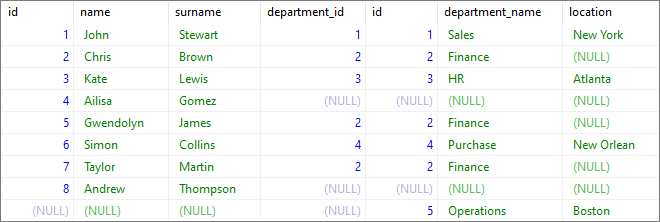EN
PostgreSQL - Full Outer Join
0
points
In this article, we would like to show you how to do FULL OUTER JOIN in PostgreSQL.
Quick solution:
SELECT * FROM "table1"
FULL OUTER JOIN "table2" ON "table2"."column_name" = "table1"."column_name"
Practical example
To show how the FULL OUTER JOIN works, we will use the following tables:

Note:
At the end of this article you can find databases preparation SQL queries.
Example
In this example, we will select all information about users and departments.
Query:
SELECT *
FROM "users"
FULL OUTER JOIN "departments" ON "departments"."id" = "users"."department_id"
Output:

Database preparation
create_tables.sql file:
CREATE TABLE "departments" (
"id" SERIAL,
"department_name" VARCHAR(50) NOT NULL,
"location" VARCHAR(50) NULL,
PRIMARY KEY ("id")
);
CREATE TABLE "users" (
"id" SERIAL,
"name" VARCHAR(50) NOT NULL,
"surname" VARCHAR(50) NOT NULL,
"department_id" INTEGER,
PRIMARY KEY ("id"),
FOREIGN KEY ("department_id") REFERENCES "departments" ("id")
);
insert_data.sql file:
INSERT INTO "departments"
("id", "department_name", "location")
VALUES
(1, 'Sales', 'New York'),
(2, 'Finance', NULL),
(3, 'HR', 'Atlanta'),
(4, 'Purchase', 'New Orlean'),
(5, 'Operations', 'Boston');
INSERT INTO "users"
( "name", "surname", "department_id")
VALUES
('John', 'Stewart', 1),
('Chris', 'Brown', 2),
('Kate', 'Lewis', 3),
('Ailisa', 'Gomez', NULL),
('Gwendolyn', 'James', 2),
('Simon', 'Collins', 4),
('Taylor', 'Martin', 2),
('Andrew', 'Thompson', NULL);